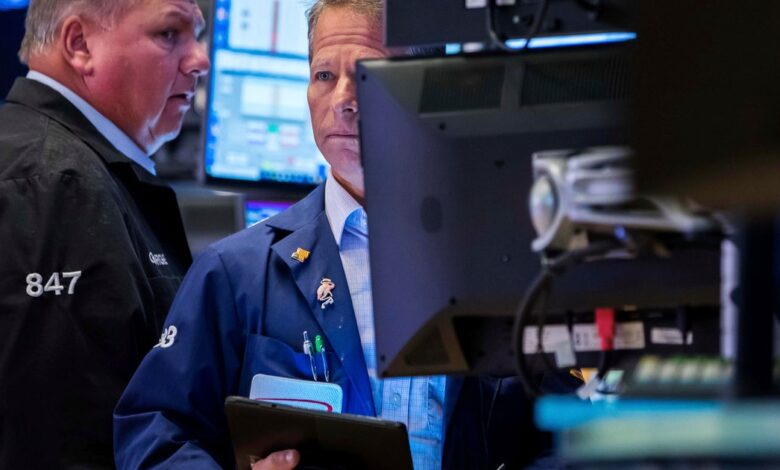Stocks cap a manic week with their best performance since November 2023

After one of the most turbulent weeks on Wall Street in recent history, stocks ended higher on Friday, with investors setting aside concerns — at least temporarily — about the growing trade war between the U.S. and China.
The S&P 500 gained 95 points, or 1.8%, to 5,363, while the Dow Jones Industrial Average added 619 points, or 1.6%, and the Nasdaq Composite rose 2.1%.
After a week full of monstrous swings, the S&P 500 posted its best weekly performance since November 23, while the Nasdaq saw its best week since November 2022, according to the financial data firm FactSet. Even so, economists are cautioning that the growing trade war between the U.S. and China could crimp the nation’s growth.
“‘Rollercoaster’ is not a technical term but it is probably the best adjective to describe price action across equity markets this week,” noted Adam Turnquist, chief technical strategist for LPL Financial, in an email.
Beijing on Friday announced that it would raise tariffs on U.S. goods to 125%. That matches the 125% duties on Chinese goods that President Trump announced this week — those tariffs will rise to as much as 145% for some of the Asian nation’s products.
“The U.S. alternately raising abnormally high tariffs on China has become a numbers game, which has no practical economic significance, and will become a joke in the history of the world economy,” a Chinese finance ministry spokesman said in a statement announcing the new tariffs. “However, if the U.S. insists on continuing to substantially infringe on China’s interests, China will resolutely counter and fight to the end.”
Pressure also eased a bit from within the U.S. bond market. The typically more boring corner of Wall Street has been flashing signals of stress this week that have been serious enough to demand attention from both Wall Street and President Trump.
“China’s tit-for-tat retaliation in its rapidly escalating trade war with the U.S. exerted some renewed pressure on equities and the dollar today, with bonds still buffeted by expectations of monetary easing and signs of market dislocation,” John Higgins, chief market economist with Capital Economics, said in a report.
Gold prices rose more than 2% to $3,250 per ounce Friday following China’s tariff hike as investors crowd into safe havens.
The S&P 500 remains down nearly 13% from its latest peak on Feb. 19, while the Dow and Nasdaq have fallen 12% and 17%, respectively.
Those declines reflect investor concerns about the impact of multilateral tariffs on corporate profits and on the broader economy, with some analysts raising the odds of a recession.
“While the White House has tried hard in the last 1.5 days to spin things positively on trade, with a lot of talk about negotiations, investors are seeing through the noise and realize the irreparable damage inflicted on the global economy from Trump’s reckless tariff campaign,” equities analyst Adam Crisafulli, head of Vital Knowledge, told investors in a research note.
The news for markets isn’t uniformly grim. The Dow soared nearly 3,000 points on Wednesday, while the S&P 500 and Nasdaq enjoyed their biggest one-day gains in decades after Mr. Trump paused “reciprocal” tariffs on dozens of countries, with the exception of China, for 90 days.
Inflation in March also cooled more than forecasters expected, while recent signs show the job market remains resilient. How long those plates can keep spinning is unclear, especially as tariffs start nudging up costs for American consumers.
Despite Mr. Trump’s move this week to ratchet down trade tensions, Americans seem worried. New data from the University of Michigan shows consumer confidence sinking to its lowest level since the depths of the pandemic, with more people expecting unemployment to rise.
The decline in sentiment was “pervasive and unanimous across age, income, education, geographic region and political affiliation,” said Joanne Hsu, director of the survey, in a report.
contributed to this report.




